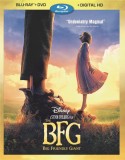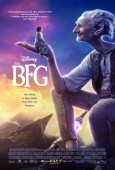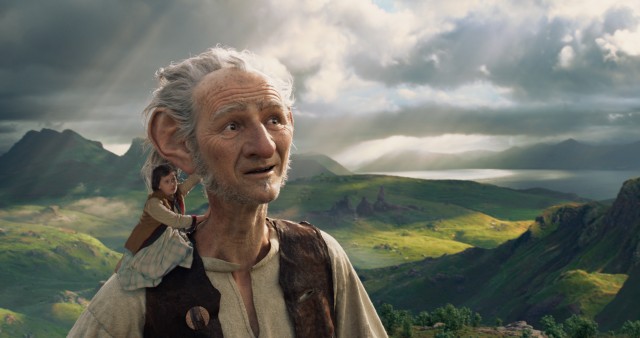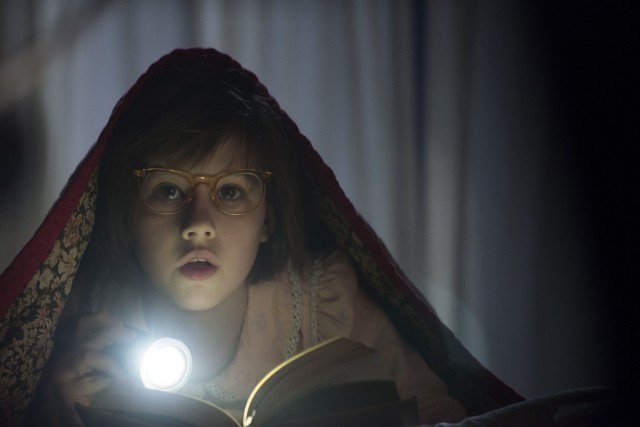The BFG Movie Review

The BFG is now available on home video. Read our review of the Blu-ray + DVD combo.
 |
Roald Dahl's The BFG
Theatrical Release: July 1, 2016 / Running Time: 115 Minutes / Rating: PG Director: Steven Spielberg / Writers: Roald Dahl (novel), Melissa Mathison (screenplay) Cast: Mark Rylance (The BFG), Ruby Barnhill (Sophie), Penelope Wilton (The Queen), Jemaine Clement (Fleshlumpeater), Rebecca Hall (Mary), Rafe Spall (Mr. Tibbs), Bill Hader (Bloodbottler), Σlafur Darri Σlafsson (Maidmasher, Cook), Adam Godley (Manhugger, Lout #1), Michael Adamthwaite (Butcher Boy, Danish Driver), Daniel Bacon (Bonecruncher, Lout #2), Jonathan Holmes (Childchewer, Pub Landlord), Chris Gibbs (Gizzardgulper, Late Night Walker), Paul Moniz de Sa (Meatdripper, Lout #3) |
Buy The BFG from Amazon.com: Blu-ray + DVD + Digital HD DVD Instant Video
After several years of making austere dramas for adults, Steven Spielberg lightens up with The BFG, all-ages entertainment adapted from the 1982 children's book by Roald Dahl. This big-budget fantasy represents the final movie of E.T. screenwriter Melissa Mathison, Subtly set in the 1980s, the film opens with insomniac young protagonist Sophie (Ruby Barnhill) occupying herself during the wee morning hours at the London orphanage she calls home. While looking out the window, she discovers a large figure lurking in the shadows. The figure approaches, reaches his hand in through the window, grabs Sophie and the blanket in which she's hiding, and brings them back to Giant Land. Her captor is a giant, although where he comes from he is called Runt by the others who all tower over him. This large-eared, pointy-nosed, long-necked giant (a recognizably motion-captured and excellent Mark Rylance, fresh off his Bridge of Spies Oscar win) is a gentle one, whom Sophie will come to dub Big Friendly Giant, or BFG for short (aha!).
Speaking with a charming vocabulary that could only have come from the mind of Dahl, the BFG explains his world to Sophie, why he's taken her, and why she must hide from his fellow giants, who love the taste of "human bean." The BFG lets Sophie tag along on his work run, catching and jarring dreams that he will then supply to sleeping children.
The two outsiders form a special, unconventional friendship, but they find themselves in danger when the boorish other giants, led by Fleshlumpeater (Jemaine Clement), discover Sophie's blanket left behind in their home and come looking for her.
In a bizarre turn that again could only have come from Dahl's imagination, Sophie and the BFG take the extreme measure of enlisting the Queen of England (Penelope Wilton) to help them avoid doom at the hands of Fleshlumpeater and his nine or so brethren.
The BFG is quite bigger in scope than other Dahl adaptations. It is loaded with visual effects, necessarily so. You know those will be state of the art in a Steven Spielberg movie and, indeed, they are. While digital characters are not the novelty they were some years ago, they still represent a challenge and, if done properly, an achievement. The BFG and his less friendly counterparts need to look real and believable, but not so real to approach the uncanny valley as some accused Robert Zemeckis' mo cap works of the 2000s. Spielberg and a visual effects team from Weta Digital pull that off with ease. You never doubt the giants, which exist comfortably in what feels like some state between live action and animation.
No one can dispute Spielberg's technical prowess, which has been on clear display in even his lesser films. The bigger feat here is that the director captures the emotional elements of the story. You'd have to go back quite some time to find a Spielberg movie as touching and full of heart as this one. His latest efforts, the last three of which have all been nominated for Best Picture Oscars, have been tough to warm to due to their schmaltz (War Horse) or deliberate monochromatic coldness (Bridge of Spies, Lincoln). BFG represents a welcome change of pace for the accomplished filmmaker. Within the Spielberg canon, it most resembles in tone and spirit Hook, the Peter Pan retelling many millennials swear by. This is only his second PG-rated movie since that was released a quarter-century ago.
Though it is kind of being marketed like a Harry Potter movie, The BFG is hardly like that fantasy film franchise. It is faithful to Dahl's book, which probably will hurt its chances with those wanting a 2016 family film, not a 1982 children's novel. Young viewers in attendance at my screening seemed restless, only really responding to a broad yet very funny scene of "whizzpopping", No studio has ever been better equipped to withstand an underperformer than Disney right now, with this opening while Finding Dory is well on its way to joining Zootopia, The Jungle Book, and Captain America: Civil War in the billion dollars worldwide movie club. Alice Through the Looking Glass is one of the biggest flops of all time domestically and who even cares in the midst of the studio's banner year of unprecedented success? I'm less concerned with BFG's commercial prospects than I am relieved to find Spielberg again making something genuinely fun and enjoyable on more than an academic level. It's not perfect and that visit to Buckingham Palace is a tad perplexing as far as tone-altering detours go. But overall, it's a pleasant union of the talents of both Spielberg and Dahl.
Buy The BFG from Amazon.com: Blu-ray + DVD + Digital HD / DVD / Instant Video
|
Related Reviews:
DVDizzy.com | DVD and Blu-ray Reviews | New and Upcoming DVD & Blu-ray Schedule | Upcoming Cover Art | Search This Site
DVDizzy.com Top Stories:
Now in Theaters: Finding Dory Alice Through the Looking Glass The Jungle Book (2016) The Legend of Tarzan Swiss Army Man
Steven Spielberg: Bridge of Spies The Adventures of Tintin Indiana Jones: The Complete Adventures Catch Me If You Can Lincoln Jaws
Roald Dahl: Willy Wonka & the Chocolate Factory Charlie and the Chocolate Factory Fantastic Mr. Fox James and the Giant Peach Matilda
Written by Melissa Mathison: The Black Stallion | Walden Media: Bridge to Terabithia Ramona and Beezus City of Ember
Pan Gulliver's Travels Jack the Giant Slayer
Text copyright 2016 DVDizzy.com. Images copyright 2016 Disney, Amblin Entertainment, Reliance Entertainment, Walden Media.
Unauthorized reproduction prohibited.


